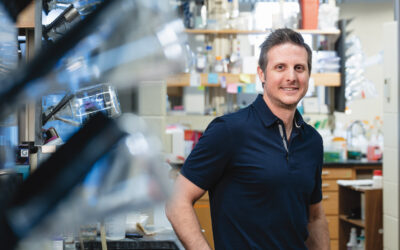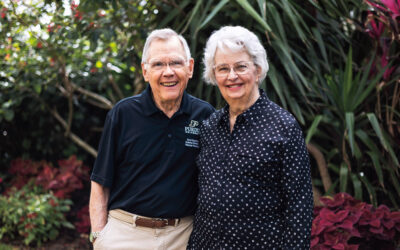
Openly sharing her mental health struggles helped Maurine De la Paz build a community on campus — 7,500 miles from home
A scheduling mix-up nearly cost Maurine De la Paz her spot in pharmacy school. Although born in Indianapolis, De la Paz moved with her mother to Guam when she was in the third grade. It was from that small island in the Pacific — 7,500 miles from Indiana — where she was navigating the Purdue admissions process.
“I misread the deadline for scheduling an online interview,” says De la Paz, now a third-year pharmacy student. “I thought I still had time, but they were only doing in-person interviews and there weren’t any slots left. I was so sad.”
Panicked, she shot off an email to Jennifer Ulutas, senior administrative assistant for the Office of Student Services (OSS).
“I begged Miss Ulutas for an in-person interview,” De la Paz says. “I said I would pay the $3,000 plane ticket. Purdue is my dream school. I couldn’t miss this opportunity. She was so nice and told me she’d do what she could.”
The call came through at 3:00 a.m. in Guam, which is a nine-hour time difference from West Lafayette. Ulutas was able to confirm an online interview with Steven Myszak, assistant dean for student affairs, and Patti Darbishire, then-dean of academic affairs, scheduled for 3:00 a.m. the following week.
“I was so excited, I was crying,” De la Paz says. “I was so tired and nervous during the interview. I was shaking the entire time. If it were not for Miss Ulutas pulling everything together last minute, I would not be at Purdue. I am eternally grateful to her. When I got to West Lafayette, I gave them all a flower to show my appreciation, to thank them for looking my way.”
She was thrilled to be on campus, but by the end of her first semester, De la Paz started to have some doubts. She hadn’t formed a friend group. She felt overwhelmed by the academic rigor of her coursework. She questioned whether she was intelligent enough to be here.
“I was a straight-A student on Guam,” De la Paz says. “But when I came to Purdue, it was like, ‘Why is everything so hard?’ I was really struggling.”
She reached out to Myszak, who not only showed concern for her well-being, but provided support through a referral to Counseling and Psychological Services (CAPS). De la Paz had been diagnosed with depression a few years earlier, but she never sought out therapy or medication to treat her diagnosis until she came to Purdue.

“Unfortunately, on Guam, mental health is a very taboo subject,” De la Paz says. “It’s often associated with substance abuse because people don’t seek medical treatment. Instead, they abuse substances to try to numb the thoughts in their head. The suicide rate in Guam is significantly higher than in the United States. That’s why I’m such an advocate for talking about mental health. I understand how hard it is to reach out for help, or even have access to it. Talking about mental health should be normalized because when you have the right access to care, it gets better.”
Two years later, De la Paz now has a circle of friends who check in on her when she seems withdrawn. She organizes cultural food nights to promote the diversity among her classmates. She’s learned to manage her coursework and is on track to complete her PharmD. She hopes to one day work in the psychiatric branch of a Veterans Affairs clinic, helping patients with PTSD and other mental health disorders.
The positive and uplifting community she found in the College of Pharmacy confirmed what she always believed in her heart — she was meant to be a Boilermaker.
“I still give Miss Ulutas a hug every time I see her,” she says. “It really is a Purdue Pharmily.”



